#attention economy
Text
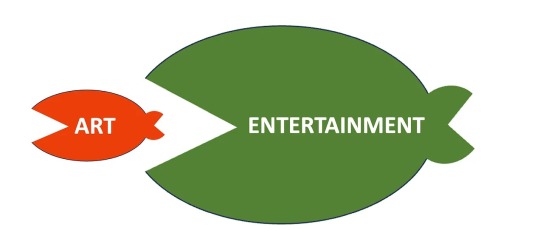

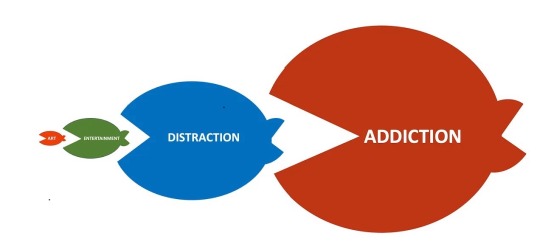
post-entertainment society
#social media#behavioral addiction#attention economy#mental health#surveillance industry#not a perfect article but I love these fishes
203 notes
·
View notes
Text
I feel like there's a part of that whole "Musk is getting rid of the block feature" discussion that we should pay more attention to.
Just to note: while what I'm saying isn't a groundbreaking revelation, it's a lens we need to adopt more in current political discourse.
... when right-wingers talk about "free speech" their definition is different to yours. To you it means being able to express yourself without being silenced. To them it means "I want you to be forced to listen to my vilest takes."
Under that definition the people on FOX complaining about their lack of freedom of speech to millions of viewers suddenly makes sense. It also works really well with Musk's antics about Twitter being a bastion of freedom of speech while banning journalists and why it's a very straightforward progression to, at some points, take the block function away.
Ever ponder why right-wing platforms like Parler and Truth Social don't succeed? They're just echo chambers for right wingers, of which there's - let's be real here - no shortage. No, they need a liberal audience and none of these apps provided that.
But here's the key takeaway from this: This concept is the whole foundation to Trump's appeal.
Since that escalator-ride Trump has been a megaphone for the most unhinged right-wing takes. And due to the, let's be frank, surreal spectacle of it, liberals couldn't take their eyes off of him. (Edit: It's also why the Trump indictments seem to help Trump. It's the promise of a highly visible platform to his base)
If you're wondering why DeSantis imploded on the runway of his campaign, it's exactly that. He drew enough attention to him but didn't do an obscene enough victory dance after hurting people. He didn't announce, commentate and rub the cruelty in enough. It's the stuff the right goes beserk for at the moment. "Triggering the libs" and "free speech" are synonymous to them. And - if nothing else - Trump is great at forcing us to watch and listen. That man tried to make 9/11 about himself.
And, this right here, is your call-to-action: I want you to break that spell.
The difference between "Trump, the Messiah of proto-fascists" and "Trump, a lunatic ranting at people distancing themselves from him" is your attention. Don't give him any.
We don't need any further proof that he's despicable. If somebody hasn't turned away from him now it's not because they haven't realized it yet. So can we please ignore him now and watch his base drop him like a hot potato just like they did with DeSantis?
#reddit refugee#elon musk#enough musk spam#musk#twitter#attention economy#political discourse#trump#trump 2024#free speech
94 notes
·
View notes
Quote
Governing the soul well means, among other things, paying attention to what we pay attention to.
I am the Prioress of My Soul - by Karen Swallow Prior
27 notes
·
View notes
Text
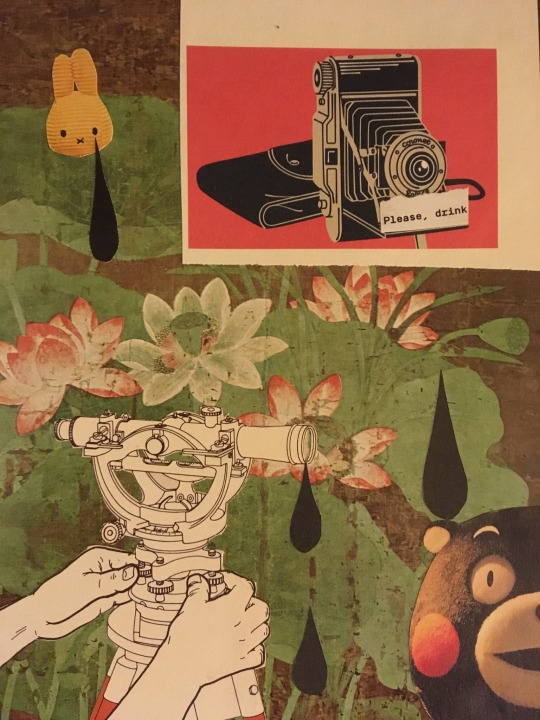
drip drop remix of older piece needing work. Jan 2024
everything always comes back to Alice in Wonderland. notice the hare and cheshire cat and drink sign
#analog collage#paper collage#collage#collageart#papercollage#kolaj#collage on tumblr#handmade collage#collageartist#collage on paper#attention economy#alice in wonderland
10 notes
·
View notes
Text
Social Media, Sousveillance, and the Self (The Three S’s!) REVISED AND BASS BOOSTED
Preface: I posted this as a gaggle of thoughts some months ago, which you can see if you scroll down just a little bit on my blog. These thoughts were decently unorganized and months later, after slow broiling and marinating these thoughts some more, I decided to turn it into a real conjecture of sorts.
Very special thanks + shoutout to my philosophy professor Daniel Rodriguez-Navas for his careful, thoughtful, constructive, and encouraging guidance throughout the development this paper.
Most young people are socially expected to have a form of social media now, and especially expected to have some form of personal information be public. Many find it strange if one does not post photos of themselves online. Most of us, generation Z, are expected and encouraged to contribute to this massive user-curated database, and in exchange, we are able to receive more attention than what was previously fathomable in the form of likes, shares, and comments. This attention is addictive, debilitating, heart-wrenching and hyper-fixated. It has never been possible in human history to access this many people at once, to be heard by this many people and hear this many people. The digital space has never been “natural” - though depending on particular definitions of “natural”, the transhumanist may argue that the digital space is the next step in evolution; an extension of the human realm. But we were not eased into this digital realm, we were thrown, many of us at a very young age, into this realm with a violent and perverted amount of freedom, enticed by information overload and the addiction of attention. The societal over-exposure to the current climate and habits of social media platforms has had not only a detrimental effect on users’ physical health and self esteem, but has also created an uncanny simulacrum of the ways in which we interact and present ourselves with/to others in real life. The incorporation of social media in our everyday lives has solely transformed the ways in which we love, hate, cry and laugh, prioritize - at others and especially ourselves.
The new product of attention has become a pinnacle of desire; and we pay with sensation, with shock, with beauty and individuality. When these technological experiments first came out, our young, malleable, dissatisfied minds were the first to latch on. Our parents critiqued this, which made the project even more successful. But it is not a phase like our parents said it would be. They caved. All it took was a few years of normalization - advertising, attention, and they too, became hooked. A 2021 Pew research center study found that 91% of US adults aged 30-49 use online platforms, slightly decreasing in ages 50-64 with 83%, and 49% in adults aged 65 and up. We no longer even have an ancient antagonist to complain about “kids these days”. It has become all free and liberated, no shame in this addiction because the algorithms have improved, proved to be impenetrable in its strategy.
What we now value is increasingly impacted by the digital sphere, riddled with advertisements for particularly desirable lifestyles. With a life revolving so much around the aspect of the digital realm, and with the digital realm being created on the foundation of capital pursuit, value is no longer personal. Life and culture are no longer personal. The personal is no longer personal. Lee Artz, author of “Global Entertainment Media: A Critical Introduction” describes how world culture no longer stems from local cultures, created by people. Instead, TNMCs (TransNational Media Corporations) create a culture based off of the pursuit of production and wealth, skillfully peppered with some features of local culture for the sake of relatability and familiarity, sold under the guise of “cultural diversity”.
The transaction is subtle - we buy a fix of attention, a sense of connection in exchange for personal information, the more intimate the better. Post a photo of yourself - better if you are wearing less, better if you are doing something vulnerable, intimate, better with more controversy. A 2018 study by Bell, Cassarly and Dunbar examines the extent to which young women aged 18-24 posted self-images that were sexually suggestive and its correlation with the amount of “likes” and online engagement one would receive. The results concluded that this type of positive engagement on sexually suggestive photos encouraged young women to post more of them. As young people have been subject to this reward system for longer and whilst our young minds are still developing, we have a heightened sensitivity to this type of social reward. The oversharing of one’s sexuality and body essentially transfers ownership, or feeling of entitlement to the consumer, who possesses the power of encouraging it, or negatively engaging.
It’s not only sexualization that receives this engagement - the new phenomenon of oversharing personal information on the internet, especially now that less people are choosing to stay anonymous on the internet than ever before, has become essentially a new norm. Simply opening the Tik Tok app will present you with people in their homes, talking to the camera about intimate, vulnerable, and often embarrassing stories in full detail. The fascination with this seemingly raw and unfiltered form of content, or sexualized content, taps into a different type of perversion in the human psyche; this type of content, because it is in a way so humiliatingly honest, welcomes the most brutal responses. Though many love informational oversharing, with netizens commonly expressing that it makes them feel better about themselves, or relieved in its relatability, a 2022 study concluded that informational oversharing stems from anxiety and alienation from society, where people desperately try to find intimacy, attention, and relatability in their vulnerability. “Better to shock than to bore” - or relevance over irrelevance, has become the subconscious logic. Relevance is emphasized more than ever now, where even “normal” people have a fixation on “staying relevant”, much like a celebrity would traditionally have. The “digital footprint” is no longer about reservation or preservation, it is about sensation and impact. That’s the new age of fame, and it is stupidly easy, stupidly addictive.
I feel like this newfound addiction to attention and instant gratification has shifted our collective values. We value privacy much less, in favor of attention. Social media platforms have taught us that we can receive a great amount of attention, validation, and discourse just by trading one’s privacy, the value of which has been artificially decreased by TNMCs just as the value of fame/exposure has been artificially increased.
The strategy of self advertisement is now learned by young adolescents before, or even instead, of the strategies of self preservation and self protection. No real cyber literacy is taught - it is simply learned through experience. Older generations and very young children do not have the years of developmental experience infiltrated by the digital space to garner an awareness of the real-life-to-digital dissonance. The two are not as easily separable to someone naive to the difference of impact they have. The digital space gives one, in a way, the illusion of ultimate privacy, almost like it encourages the exploitation of your deepest vulnerabilities. You can tell your innermost secrets out loud, alone, in the comfort of your own room, and be heard and seen by millions. Accounts of very young children or older people often go viral because their personas online are often either the most vulnerable pure reflection of their reality, or they are presenting themselves in a very obviously curated way, where they naively act like how they think people on the internet should act. These types of accounts are almost always loved by the public in an exploitative or patronizing way, where the humor lies in the fact that they do not act on social media in the way that shows a sense of “getting it”, part of this dreadful post-ironic, terminally blasé attitude that has plagued those with experience-based, shame-based digital literacy. I propose that this attitude is formed out of self protection, or a need to present oneself as somebody who is impenetrable in vulnerability.
The internet is where anything is said mostly without real life consequences - and this is another large aspect of why the digital space is addictive. One gets addicted to the honesty, which coaxes you into delving into and producing opinions that one would not think of producing in real life. Because of this honesty, people often purposefully think of things to critique and reasons to attack. But this is also a product of the oppressive real-life social norms of courtesy and the overbearing expectation of niceness. The digital realm is, in a way, a solace where we can reject that. But that freedom of communication is simply on the other extreme end of the spectrum of healthy communication. The pendulum never stops in the healthy middle. I often like to think of all my social media comments as if they were being said to me, in person, by the people behind these profiles. They usually have photos of themselves publicly posted. They say vile things because I am not real. To them, and funny enough, oftentimes to myself as well, I am just a monkey that is dancing on the circuit board inside their phones, in their pocket, accessible at any time and able to be deleted at any time. I am so beautifully insignificant, so temporary, and yet it inexplicably gives me a sense of a permanent presence - a stable one, that will not fade. I am not immune to the fetishization of fame.
Schlosser identifies self presentation versus self disclosure; self presentation being a goal-oriented, strategic, and curated presentation of the self, with self disclosure being sharing factual information to another about oneself, regardless of its impact on one’s social reputation. She finds that the internet gives affordance for self disclosure due to the option of anonymity, but also discourages disclosure through unfiltered and open audience feedback. Through personal observation, I believe that the issue is more complex, and calls for a more nuanced discussion than whether social platforms promote or discourage presentation or disclosure - because this discussion suggests that there is no blurred line between the curated self and the objective self. Even in a non-social media context, it is hard to differentiate between genuine and performative behavior, since it is so hard for a subject to differentiate and admit to it. With how engrossed most people are within their digital selves, I will argue that it is all presentative - and that even content that feels like disclosure is self presentation. Is there really no motive in disclosure, as Schlosser puts it?
Maybe disclosure is innocence - a naieveté that is ironically revered and unironically feared. With the internet being an automatic concrete archive of one’s opinions and expression and a machine that almost always guarantees a consequence, there is a saying that has emerged in recent years: “be careful of what you say on the internet”. This is referring to the fear of getting “canceled” for saying something problematic, or to the possibility of publicly embarrassing oneself whether in action, speech or aesthetics. When people have an understanding of this ruthless internet system, everything one says and does on the internet is purposefully curated, with extra care in the desired effect of the content. Even when content is created for the purpose of self-degradation or self embarrassment for humor, it is still careful to not be too vulnerable, or too weird.
Referring back to my earlier observation of how content from young children or older people who do not necessarily “get” the internet often go viral, I think that maybe this form of simple, naive, innocent and vulnerable content is the only true disclosure that exists on the internet - unintentional disclosure. Unintentional disclosure also can come forth in times where one may try to present a lie to consumers, and are proven false. I believe that this is why these videos and posts go viral - we all truly do love disclosure. We love honesty and vulnerability, proof of humanness and unintentional subjects of endearment. I do believe that my current generation is striving for real human connection, closeness, and earnest communication in this epidemic of loneliness, spearheaded by the cave-like illusion of comfort that technology brings. We’re just scared - I know I am - because who wouldn’t be, as involuntary test subjects for mystifying technologies?
Altman and Taylor proposed the social penetration theory (SPT), where surface-level relationships can develop into much deeper ones, where the seal of intimacy gets penetrated, in a sense, through the sharing of personal information - self disclosure. The goal within self disclosure is social penetration, which is more present than ever in the context of social media, except social media does not give the affordance of other strategies to gain social penetration - such as a slow, gradual relationship, face-to-face contact, and mutual acknowledgement. Since content creators do not have these other affordances, I will argue that they feel the urge to go to extremes with a performance of self-disclosure, for the main goal of social penetration, creating parasocial relationships.
The parasocial relationship is the driving force of the use of influencers in modern day advertisement. Simulating intimate, honest relationships is what the content creator strives for, because that is what creates the most engagement and makes for the best product endorsements, encouraged and funded by TNMCs. It is what the consumer also loves to consume, because without the added aspects of social penetration such as a slow, gradual relationship, face-to-face contact, and mutual acknowledgement, the consumer is able to have a fundamentally not whole but idealized version of the curator, where the curator’s personality can seem much more wholesome, specified, honest and relatable than the personality of anyone that the consumer could know in real life.
The influencer blurs the line between “normal” person and celebrity. Celebrities used to be elusive creatures, where a sighting of them outside of a movie or magazine was considered fascinating - because celebrities used to be untouchable. They were Gods rarely among men and worshiped for their unapproachability. The influencer in the digital age has fundamentally transformed the concept of fame into one based not necessarily on traditional talent, but on social penetration, controversy, and very importantly, attractiveness. Even traditional celebrities are now, in recent years, joining social media platforms to engage with fans in a parasocial way - to show that celebrities are just like us! They eat food, shit it out, and have bad hair in the morning! We have all found out how profitable it is to be human - but not too human - that now, even the Gods have come down to earth to cash in.
Even if consumers are aware of these dynamics in their media consumption, they will still often choose to engage positively in this system. 54% of young Americans would even become an influencer themselves if given the chance, because of how it is advertised and idealized. The parasocial relationship has created a simulation of what a person should be, due to the lack of affordances for actual human connection whilst simulating a version of human connection that is advertised as better than a real human connection - but I will argue that in reality, digital social penetration, or maybe even the illusion of it, fails to satisfy real social needs, but instead of this dilemma spurring people to seek out in-person connections, the instant and effortless gratification of a digital parasocial relationship makes users simply seek out a surplus of it.
My image, or at least the image I carefully project, has been seen by millions. Millions now have a specific perception of me - two-dimensional and dictated by an altered fraction of my legitimate self, locked in time. But what is the legitimate self? The digital age has created a larger gray area in the concept of “self” and “individual”, widening the hole that capitalism has created, where one is not only a product, but a walking advertisement. We now express and define the self through sousveillance, and often do not know ourselves without it. The self has come to be defined as the density and reaction of digital perception. Sometimes people no longer know who they are after their popularity leaves them. Late stage capitalism, bass-boosted by new technologies, has made individuals to be solely defined by reaction - because reaction is what creates transaction, what creates currency, whether it be a fix of mental gratification or actual money. I cannot think of anyone who would possibly like to admit it, but there is certainly a present attitude of “if you don’t exist online, do you even exist? Why wouldn’t you want to be online?” Why wouldn’t you want to partake in this addictive algorithm, endless scrolling, information overload, stimulation overload, and the promise of attention? You are weird if you don’t.
With the value of personal information going up, and the value of privacy going down, with people believing that they are so insignificant that their information does not matter - I will refrain from using that as a main talking point. The promotion and investment into the advancement of social technologies almost feels like state-funded propaganda, but I also will not get into that talking point in fears of sounding like a crazed conspiracy theorist. The main issue is how it has shifted our entire social attitude, and has deeply affected the social dynamics of communities and circles in real life. Human connection is strained by image and obsession. It is strained from a disembodiment of the self and the environment. We now have to control our social lives online (transcending location and social boundary) as well as our social lives in real life. Because of how personal one’s social page seems, and how unintimidating and easy it is to contact anyone, there is no secrecy left. And some of the world’s greatest stories revolve around the beauty of secrecy.
This conjecture is not just to say that everybody should return to analog, and that the digital age has not had its glorious moments - but social media tries to convince you that the main purpose of your patronage to their platform is connection, fun, and inspiration, while the purpose is really all capital. And because we, the 21st century, have become test subjects for these new, cruel, untested technologies, there was truly no restriction or boundary on who was deemed able to access essentially this panopticon of positive/negative reinforcement, and content from every dark crevice of the world. This promotion of self exploitation has wedged its way into being a priority for many. Friends become friends and lovers become lovers based on aesthetics, image, and attraction. The curation of a profile is just as important as the curation of the real self. The curation of a profile becomes the self. The line between who one is online and in real life is becoming more and more blurred; people try to mold themselves to act in the way they are able to online. Online, one is free to lust and lie and hate and obsess and love. Online, one can be confident, sexy, loud, carefully vulnerable, relentlessly controversial, smart, beautiful, mysterious, careless, carefree, detached, ethereal and unreal. But maybe humans were not meant to be all of those things, all at once.
Author’s note: If you read to the end of this, thank you, and if you’d like access to the bibliography please PM me! I would have liked to make this longer - there’s so many things I could have gone on and on about. I’d also love to hear any comments or questions or general feedback.
#social networks#social media#philosophy#sousveillance#surveillance#instagram#tiktok#digital literacy#media literacy#theory#social media addiction#attention economy#parasocial relationships#panopticon#influencers#cyber literacy#sociology#anthropology
23 notes
·
View notes
Text
Why Everyone Has ADHD Now
youtube
9 notes
·
View notes
Text
Is there even a point to getting mad at live action adaptations anymore?
I mean... what do you expect by this point? Even if they generally pay respect to the original, it's gonna feel like a cheap imitation unless they are REALLY good at matching things.
If they adapt the ideas but generally march to the beat of their own drum, many will take it an insult to the original or willfully missing the point.
Animation isn't live action. Live action isn't animation.
And these projects aren't going away at all. Sure, YOU might boycott. We could organize a massive boycott with plenty of people... but not enough.
For one thing, these new adaptation's command our attention. How will this new version botch our favor scene? The trailer looks nice actually. Maybe it'll be good actually?
For another, many YouTubers or big name bloggers WILL inevitably review the remake. They are monetarily obligated to do so. Even if it's bad, people want their dread either denied or reaffirmed. Thus this means that a lot of people will indeed check out the thing.
Pirate all you want but that attention will have a run-off effect on those not verse in sailing the digital seven seas. Thus keeping this neverending cycle neverending.
#live action#live action adaptation#natla#netflix avatar#netflix atla#atla#avatar the last airbender#animation#netflix#cowboy bebop#netflix's cowboy bebop#hate watching#attention economy#avatar: the last airbender
6 notes
·
View notes
Text
please reblog (I need to know).
#fitblr#writeblr#studyblr#tumblr polls#poll#fun polls#healthy life choices#healthblr#health and wellness#cyberpunk#dystopia#utopia#solarpunk#attention economy#tumblr#tiktok#youtube#cursed object#cursed item#creative writing#mental health#adhd#depression#apocalypse#reddit#insta#chronically online#reblog plz#online friends#autism
25 notes
·
View notes
Text
Your attention is a laser, where you point at it can burn something or carve a path forward.
#By @whizpill on Instagram#quote#quotes#positivity#positive affirmations#positive quotes#motivation#motivational#Protest#Attention#attention economy
2 notes
·
View notes
Text
youtube
We All Got Tricked Into Content Addiciton by Horses
#thought provoking#thought provoking back to school#media manipulatiuon#attention economy#psychology#neurology#mental health#Youtube
6 notes
·
View notes
Text
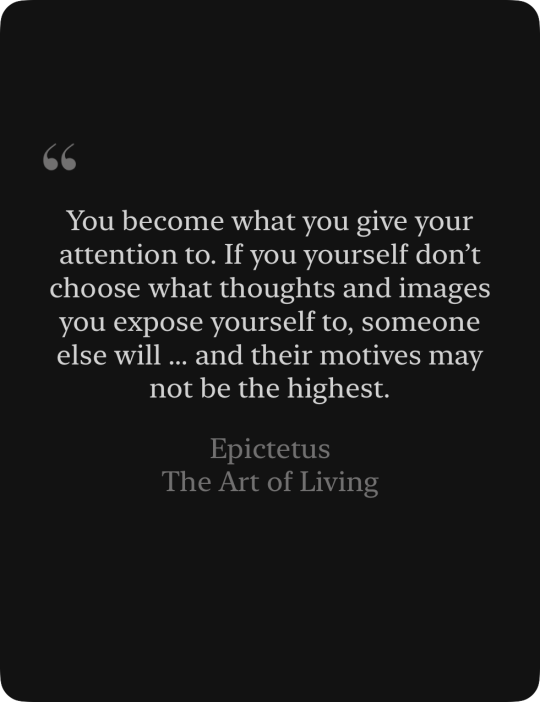
2 notes
·
View notes
Text
youtube
"Are we easier to distract? Or is the world around us just getting more distracting?"
I really appreciate this approach and also the investigate look into the research here. I don't feel like I'm less able to focus than before phones, but I do feel like there are more details and complexities that I might need to focus on (and thus I feel less capable of meeting the world where it's at.)
Also the knowledge that byte dance isn't a social media company but is instead an AI company has me wanting to avoid TikTok even more. Yikes.
12 notes
·
View notes
Text
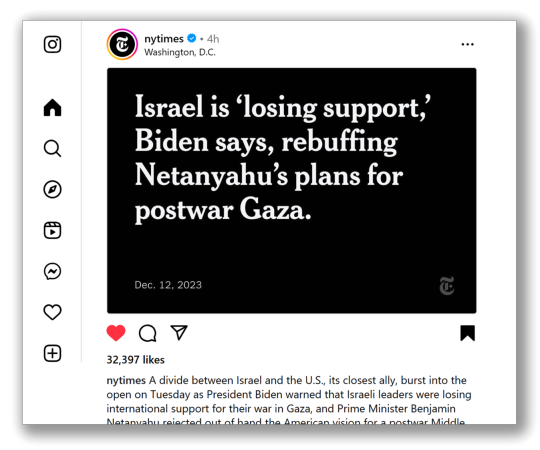
I saw the above headline on the New York Times' Instagram page this morning and it uh, inspired me to write the following comment:
And yet as typically predictable all the comments here are all, "Zionist Genocider! Zionist Genocider!" And hardly a thought is given to how the murder of innocents and childred are wrong ON ALL SIDES!! You know all that an eye for an eye and the whole world goes blind thing? Mutually assured destruction? All of us here on Planet Earth not just in the relatively mere speck of dirt many call "The Holy Land", we are all cursed to share this dirt. We must learn how to live together here on earth, or we must all share the graveyards under it. All you holier-than-thou fricks that don't even live in "The Holy Land" and calling for Death to the Enemies on whichever fricking side your fricking ass are on, please, god damn it, holy fricking stop it. Just stop.
I don't know how many non-bot eyeballs will actually land on these words over on Instagram, and I'm not sure how many of those eyeballs would actually read the words and thoughts and not just immediately and viscerally react to it with further hate and vitriol. But whatever. These are the words I typed. And these words are published. On the Internet. Whatever.
...Oh and yeah on Instagram I used frick instead of fuck (instinctually) to go around Instagram's automated comment filtering "safeguards". I thought about changing all the "fricks" to "fucks" here for the Tumblr version but I just thought, meh, whatever.
#fz_thinkingOutLoud#Israel#Gaza#NY Times#social media#attention economy#culture war#progressive#conservative#politics#humanitarianism#nettiquette
2 notes
·
View notes
Video
youtube
what would it take to make the future of the internet desirable?
8 notes
·
View notes
Text
["... I am less interested in a mass exodus from Facebook and Twitter than I am in a mass movement of attention: what happens when people regain control over their attention and begin to direct it together, again.
Occupying the "third space" within the attention economy is important not just because, as I've argued, individual attention forms the basis for collective attention and this for meaningful refusal of all kinds. It is also important because in a time of shrinking margins, when not only students but everyone else has "put the pedal to the metal", and cannot afford other kinds of refusal, attention may be the last resource we have left to withdraw. In a cycle where both financially driven platforms and overall precarity close down the space of attention-the very attention needed to resist onslaught, which then pushes further- it may be only in space of our own minds that some of us can begin to pull apart the links."]
How to Do Nothing: Resisting the Attention Economy, Jenny Odell
40 notes
·
View notes
Text
This thread is going viral today and I just have a lot of things to say about it.
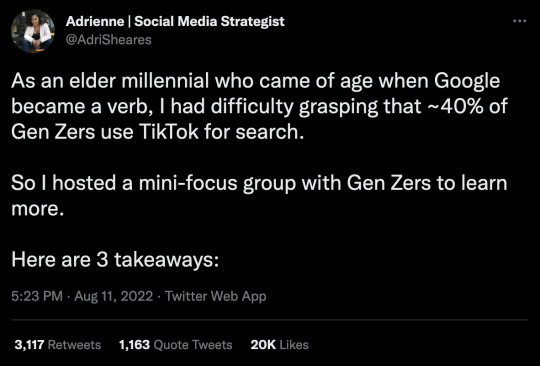

This person's purview is marketing. She is doing this research to more effectively market to Gen Z. But I don't give a shit about that. I give a shit about the "Gen Z focus group participants don't want to read to find information" and the alarm bells that rings to me.
In general, reading on paper >>> reading on screens >>>> audio >>>>> video for comprehension and absorption. Why is this?
It doesn't appear to be necessarily inherent to the screen vs print experience (other than some findings about temporal/spatial placement of events in a book, which CAN help with retention). But screen reading on a device connected to the internet, or capable of doing other things, even offline? Distraction machine. You cannot learn anything if you don't focus on it.
Furthermore, books and reading themselves are only the gate to learning (see https://andymatuschak.org/books/ for an excellent overview). To facilitate learning, you must have active involvement with new ideas. That can come from asking questions about what you've read, taking notes, discussing what you've read, connecting it to other ideas, and learning the same thing from several sources.
But those things? Those are LEARNED AND PRACTICED SKILLS. They're not a given from passive consumption of material. (What Matuschak cites as "metacognition.") And you have to CHOOSE to do them. Every time. It's hard. You cannot learn anything if you don't focus on it.
It's not that video is inherently bad for learning. It's a combination of attitudes about video (they must be "entertaining", see the Big Think piece above), distraction/lack of focus, and lack of active engagement.
It's not like these issues are new. People have been refusing to use their brains because it's hard since, well, forever. (Although the tools we have available to completely turn off our brains and let other people think for us are so fucking sophisticated today I don't think we really comprehend it). But things like democracy and pluralism are incredibly fragile, and are dependent upon an educated populace that can think critically. A functioning society cannot continue when its members spend the vast majority of their time disengaged from reality, passively consuming ideas without thinking about them, and addicted to being entertained.
Again, this is not just a generational problem. This is a fundamental problem with humans, who evolved in very different circumstances than the ones we find ourselves in. Our big, complex frontal lobes are late entries. But we greatly enjoy all the things frontal lobes have created (all the luxuries of society we take for granted until a major natural disaster). And to maintain them, or come up with new ones, we HAVE to foster a society that celebrates intellectual work. This is not a value judgment of "kids today don't read, reading is a moral good, get off my lawn" it's "we cannot continue the things we want in civilization if active learning is not cultivated." This is an emergency.
Deep focus is an act of resistance in a society that depends on your distraction to generate capital. The attention economy is real, even though it's a big house of cards built on sand.
I'm begging you, person to person, to cultivate focus in your life in some way.
26 notes
·
View notes